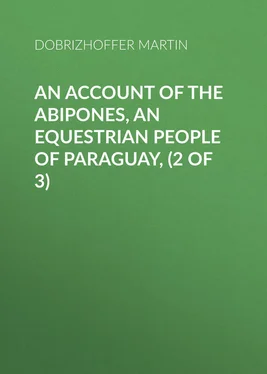Martin Dobrizhoffer - An Account of the Abipones, an Equestrian People of Paraguay, (2 of 3)
Здесь есть возможность читать онлайн «Martin Dobrizhoffer - An Account of the Abipones, an Equestrian People of Paraguay, (2 of 3)» — ознакомительный отрывок электронной книги совершенно бесплатно, а после прочтения отрывка купить полную версию. В некоторых случаях можно слушать аудио, скачать через торрент в формате fb2 и присутствует краткое содержание. Жанр: foreign_antique, foreign_prose, на английском языке. Описание произведения, (предисловие) а так же отзывы посетителей доступны на портале библиотеки ЛибКат.
- Название:An Account of the Abipones, an Equestrian People of Paraguay, (2 of 3)
- Автор:
- Жанр:
- Год:неизвестен
- ISBN:нет данных
- Рейтинг книги:3 / 5. Голосов: 1
-
Избранное:Добавить в избранное
- Отзывы:
-
Ваша оценка:
- 60
- 1
- 2
- 3
- 4
- 5
An Account of the Abipones, an Equestrian People of Paraguay, (2 of 3): краткое содержание, описание и аннотация
Предлагаем к чтению аннотацию, описание, краткое содержание или предисловие (зависит от того, что написал сам автор книги «An Account of the Abipones, an Equestrian People of Paraguay, (2 of 3)»). Если вы не нашли необходимую информацию о книге — напишите в комментариях, мы постараемся отыскать её.
An Account of the Abipones, an Equestrian People of Paraguay, (2 of 3) — читать онлайн ознакомительный отрывок
Ниже представлен текст книги, разбитый по страницам. Система сохранения места последней прочитанной страницы, позволяет с удобством читать онлайн бесплатно книгу «An Account of the Abipones, an Equestrian People of Paraguay, (2 of 3)», без необходимости каждый раз заново искать на чём Вы остановились. Поставьте закладку, и сможете в любой момент перейти на страницу, на которой закончили чтение.
Интервал:
Закладка:
Add to this that the Abipones bathe almost every day in some lake or river. Bathing was certainly much practised, and reckoned of singular utility amongst the ancients. For as the dirt is washed off by the water, the pores of the skin are opened, and the perspiration of the body rendered easier and more commodious; a great advantage to the health. Some prefer cold bathing to bleeding, for by the one process the blood is only cooled, by the other it is exhausted. To continual bathing therefore, the Abipones are in a great measure indebted for the health and longevity which they possess to such an enviable degree. This opinion is confirmed in Bacon's History of Life and Death, where it is asserted that "washing in cold water contributes to lengthen life, and that the use of warm baths has a contrary effect." P. 131. The same author is of opinion that "persons who pass great part of their lives out of doors are generally longer-lived than those that stay more within." The Abipones spend most of their time out of the house, and consequently breathe the pure air of heaven which is so salutary to the human body. Though they dwell under mats spread like a tent, or in fixed huts, they never suffer the air to be entirely excluded. Nor are they content with living in the open air, they also choose to be buried there, entertaining an incredible repugnance to sepulchres within the church. As the Abipones live long and enjoy excellent health, though entirely destitute of physicians and druggists, I can hardly help reckoning their absence amongst the causes which co-operate to render the savages superior in vigour and longevity to most Europeans, amongst whom as physicians are numerous, and medicine in general use, there are many sick persons and few very old men. The Abiponian physicians, of whom I shall speak more fully hereafter, are impostors more ignorant than brutes, and totally unworthy the splendid title of physicians, being born not to heal the sick, but to cheat them with juggleries and frauds.
That health of body depends in a high degree upon tranquillity of mind is incontestible: the functions of the brain are disturbed, the stomach grows languid, the strength fails for want of food, and the better juices are destroyed, when the mind is oppressed by turbulent affections, by anxiety, love, fear, anger, or sadness. The body will be sane if inhabited by a sane mind. This being the case, we cannot wonder that the Abipones are possessed of great vigour and longevity. Their minds are generally in a tranquil state. They live reckless of the past, little curious about the present, and very seldom anxious for the future. They fear danger, but either from not perceiving or from despising the weightiness of it, always think themselves able to subdue or avoid it. When a numerous foe is announced to be at hand they either provide for their safety by a timely flight, or await the assault, and amidst jocund songs quaff mead, their elixir, which inspires them with courage, and banishes fear. Gnawing cares about the augmentation of their property, or concerning food and raiment, have no place amongst them. They make no mortal of such account as to die, or run mad, for hate or love of him. No affections with them are either violent or of long duration. This tranquillity of mind cherishes the body, and prolongs their lives to extreme old age. I allow that the climate in which they live, and which is neither starved with cold nor parched with heat, is one strengthener of the health, but I deny that it is the only one; for neither the Spaniards nor the other Indians, though they enjoy the same temperature of air, live and thrive like the Abipones. Europeans, if they envy the longevity of the Abipones, should imitate, as far as possible, their manner of life. They should tranquillize their minds by subduing vehement passions. They should interpose a little exercise of body between inaction, and sedentary occupations; they should mingle water with wine, rest with labour. They should moderate their luxuries in dress and eating. They should use simple food, not such as is adulterated by art, and for the purpose of satisfying, not of provoking the appetite, but make sparing application to medicines and physicians. And lastly, which is of the greatest importance for preserving vigour, they should abhor pleasures, the sure destruction of the body, as much as they desire a green old age.
CHAPTER VIII.
OF THE RELIGION OF THE ABIPONES
Hæc est summa delicti, nolle recognoscere quem ignorare non possit , are the words of Tertullian, in his Apology for the Christians. Theologians agree in denying that any man in possession of his reason can, without a crime, remain ignorant of God for any length of time. This opinion I warmly defended in the University of Cordoba, where I finished the four years' course of theology begun at Gratz in Styria. But what was my astonishment, when on removing from thence to a colony of Abipones, I found that the whole language of these savages does not contain a single word which expresses God or a divinity. To instruct them in religion, it was necessary to borrow the Spanish word for God, and insert into the catechism Dios ecnam caogarik , God the creator of things.
Penafiel, a Jesuit theologian, declared that there were many Indians who, on being asked whether, during the whole course of their lives, they ever thought of God, replied no, never . The Portugueze and Spaniards, who first landed on the shores of America, affirmed that they could discover scarcely any traces of the knowledge of God amongst the Brazilians, and other savages. The Apostle Paul, in the first chapter of his Epistle to the Romans, declares that this ignorance of God is by no means devoid of blame, and indeed that it cannot be excused; so that they are without excuse, because from the very sight of the things created, they might arrive at the knowledge of God the Creator . But if any one think the case admits of palliation, he will say that the American savages are slow, dull, and stupid in the apprehension of things not present to their outward senses. Reasoning is a process troublesome and almost unknown to them. It is, therefore, no wonder that the contemplation of terrestrial or celestial objects should inspire them with no idea of the creative Deity, nor indeed of any thing heavenly. Travelling with fourteen Abipones, I sat down by the fire in the open air, as usual, on the high shore of the river Plata. The sky, which was perfectly serene, delighted our eyes with its twinkling stars. I began a conversation with the Cacique Ychoalay, the most intelligent of all the Abipones I have been acquainted with, as well as the most famous in war. "Do you behold," said I, "the splendour of Heaven, with its magnificent arrangement of stars? Who can suppose that all this is produced by chance? The waggon, as you yourself know, is overturned, unless the oxen have some one to guide them. A boat will either sink, or go out of the right course, if destitute of a pilot. Who then can be mad enough to imagine that all these beauties of the Heavens are the effect of chance, and that the revolutions and vicissitudes of the celestial bodies are regulated without the direction of an omniscient mind? Whom do you believe to be their creator and governour? What were the opinions of your ancestors on the subject?" "My father," replied Ychoalay, readily and frankly, "our grandfathers and great grandfathers were wont to contemplate the earth alone, solicitous only to see whether the plain afforded grass and water for their horses. They never troubled themselves about what went on in the Heavens, and who was the creator and governour of the stars."
I have observed the Abipones, when they are unable to comprehend any thing at first sight, soon grow weary of examining it, and cry orqueenàm ? what is it after all? Sometimes the Guaranies, when completely puzzled, knit their brows and cry tupâ oiquaà , God knows what it is. Since they possess such small reasoning powers, and have so little inclination to exert them, it is no wonder that they are neither able nor willing to argue one thing from another.
Читать дальшеИнтервал:
Закладка:
Похожие книги на «An Account of the Abipones, an Equestrian People of Paraguay, (2 of 3)»
Представляем Вашему вниманию похожие книги на «An Account of the Abipones, an Equestrian People of Paraguay, (2 of 3)» списком для выбора. Мы отобрали схожую по названию и смыслу литературу в надежде предоставить читателям больше вариантов отыскать новые, интересные, ещё непрочитанные произведения.
Обсуждение, отзывы о книге «An Account of the Abipones, an Equestrian People of Paraguay, (2 of 3)» и просто собственные мнения читателей. Оставьте ваши комментарии, напишите, что Вы думаете о произведении, его смысле или главных героях. Укажите что конкретно понравилось, а что нет, и почему Вы так считаете.












